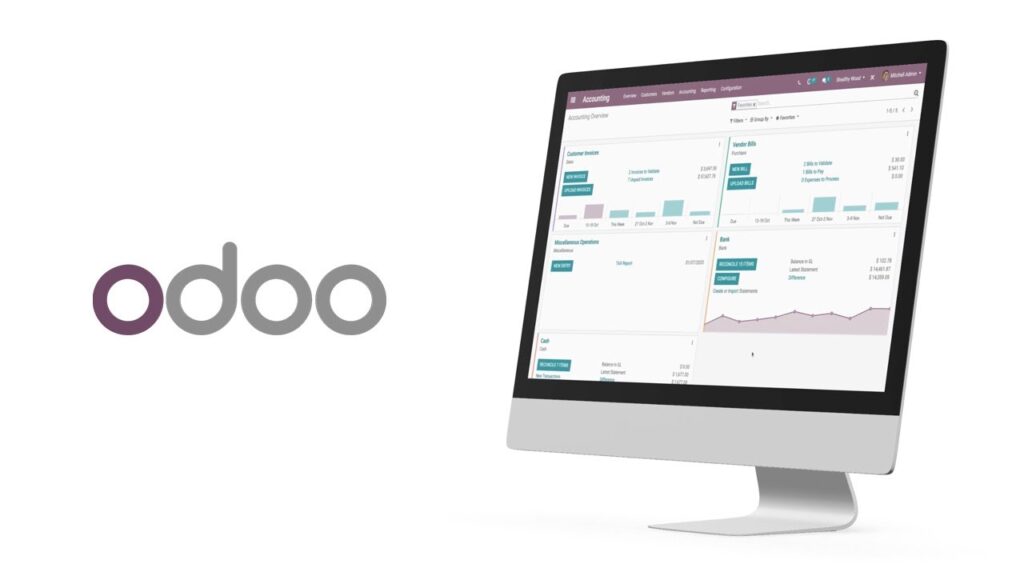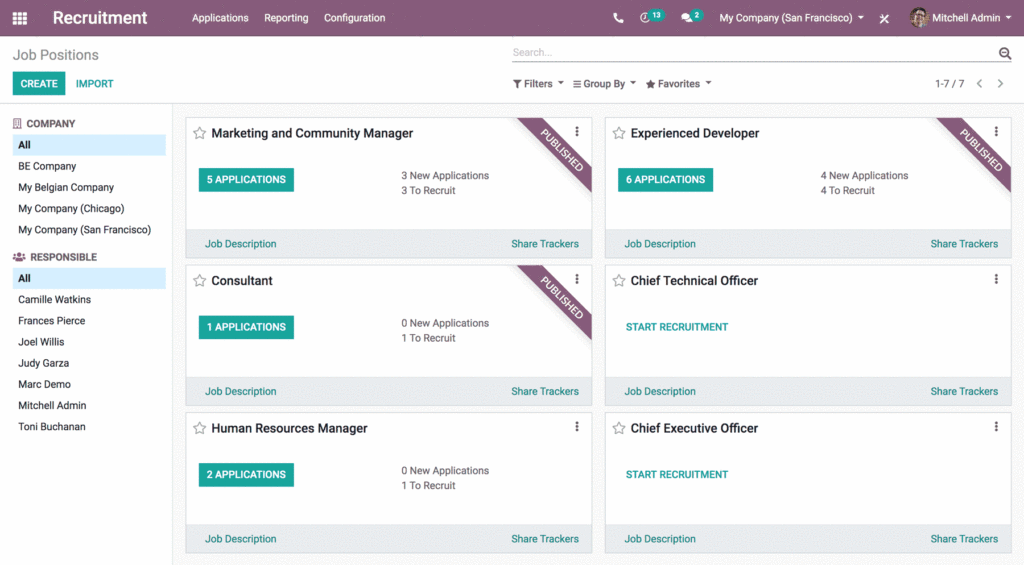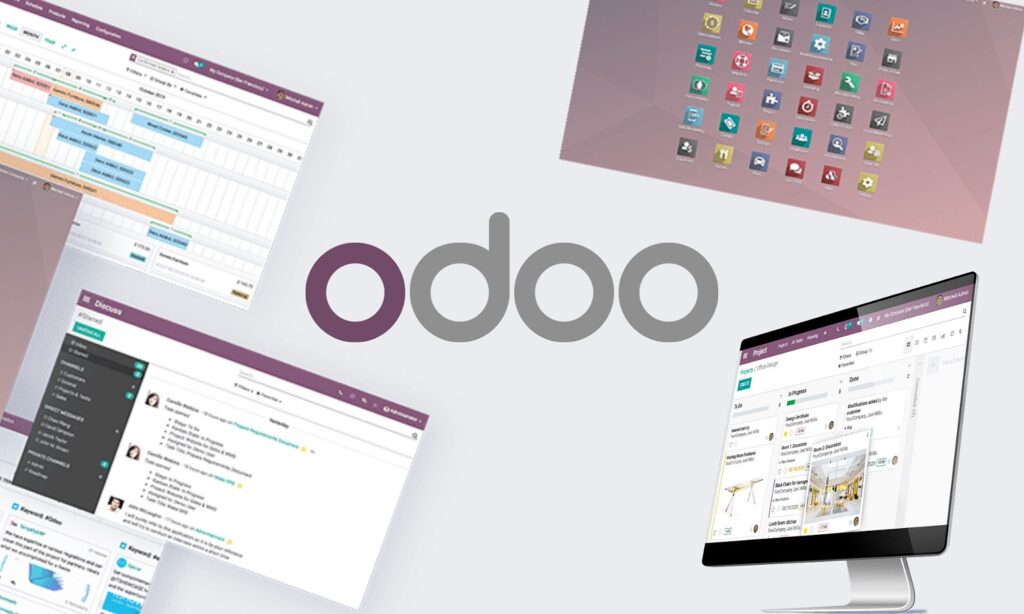Let’s find out what does Odoo do. Formerly known as OpenERP, it is an all-in-one open-source business management software suite.
It offers integrated applications to streamline and automate business processes like CRM, ERP, HRM, project management, and e-commerce.
Odoo is modular, flexible, and easy to use. Businesses can customize it by selecting the modules they need.
Odoo is a user-friendly, scalable business management platform for SMEs and large corporations.
Who is Odoo for?
- Small and Medium Enterprises (SMEs): Odoo is modular, so small businesses can start small and add features as they grow. Cost-effective for startups and small businesses.
- Mid-sized Businesses: Odoo’s flexibility allows businesses to scale and integrate modules as their needs grow.
- Large Enterprises: Odoo’s robustness and scalability suit large corporations seeking an integrated system to manage various departments and complex operations.
- Diverse Industries: a versatile platform that can be adapted to suit the needs of almost any business in any industry.
- Global Businesses: Odoo’s multi-language and multi-currency support makes it a viable choice for international companies.
Odoo is a versatile and powerful solution that can benefit organizations of all sizes. It streamlines operations, enhances efficiency, and improves business management.
How does Odoo compare to other ERP systems?
Odoo is a unique, flexible, and cost-effective ERP system. Here are some key points of comparison with other ERP systems:
- Open-source nature: Odoo is open-source ERP software that businesses can modify and redistribute. It gives them freedom and control, avoiding vendor lock-in.
- Modular design: its architecture makes it flexible and less complex than monolithic ERP systems. Businesses can select and implement only the modules they need.
- Customization capabilities: it is flexible and easily customizable for specific business processes. Other ERP systems are rigid and expensive to customize.
- Cost-effectiveness: Odoo’s open-source nature makes it an affordable ERP solution for small and medium-sized businesses.
- User-friendly interface: has a modern, intuitive UI that’s easier to use than older ERP systems. It reduces the learning curve and speeds up adoption.
- Community and support: Odoo’s large, active community ensures rapid updates and a wealth of resources.
- Integration and third-party apps: Odoo offers seamless integration with third-party apps via APIs. Other ERP systems may have limited or complex integration.
What does Odoo do: Features
- Modular structure
Odoo is designed with a modular structure, allowing businesses to choose and integrate specific modules based on their requirements.
This modular approach allows businesses to tailor the software to their needs, optimizing efficiency and productivity.
Businesses can purchase only the necessary modules and add new ones as they grow.
- User-friendly interface
Odoo’s interface is intuitive and easy to use. The software’s drag-and-drop feature allows users to easily customize and configure their dashboards and reports.
Odoo’s unique ‘edit inline’ approach makes creating and editing records surprisingly easy.
- Customization capabilities
Odoo offers a high degree of customization, allowing businesses to tailor the software to their needs.
The software’s modular structure and open-source model have allowed thousands of developers and business experts to build a vast ecosystem of fully integrated business apps.
Odoo’s customization capabilities enable businesses to optimize their operations and improve efficiency.
- Integrated applications
Odoo offers a comprehensive, integrated application suite to streamline various business processes.
The software’s modules are seamlessly integrated, allowing real-time data sharing and collaboration.
Odoo’s integrated applications cover various functional areas, including sales, accounting, project management, inventory, and HR.
- Multi-platform compatibility
Odoo can be accessed from devices and platforms, including desktops, laptops, tablets, and smartphones.
The software is available as a cloud-based service or an on-premises installation. Odoo’s multi-platform compatibility allows businesses to access and manage their operations anytime.
These features help businesses optimize operations, improve efficiency, and tailor the software to their needs.
What does Odoo do; Applications
1. Customer Relationship Management (CRM)
CRM software helps businesses manage customer relationships. Odoo’s CRM module includes the following:
- Lead management: lead management helps businesses track potential customers from contact to sale. Features include lead creation, management, assignment, and tracking.
- Sales and pipeline tracking: Odoo’s sales and pipeline tracking features help businesses track their sales pipeline and forecast future sales.
- Customer support and ticketing: customer support and ticketing features help businesses track customer support requests and tickets.
2. Enterprise Resource Planning (ERP)
ERP is a software application that helps businesses manage their core business processes. Odoo’s ERP module includes:
- Inventory management: The inventory management features in Odoo allow businesses to track their inventory levels, manage inventory shipments, and track inventory costs.
- Purchase and sales management: The purchase and sales management features in Odoo allow businesses to track their purchase orders, manage their sales orders, and track their sales commissions.
- Accounting and finance: The accounting and finance features in Odoo allow businesses to track their financial transactions, manage their accounts, and generate financial reports.
3. Human Resources Management (HRM)
HRM manages human resources for businesses. The HRM module includes:
- Employee information and management: The employee information and management features in Odoo allow businesses to track employee information, manage employee benefits, and track employee performance.
- Recruitment and applicant tracking: Odoo’s recruitment features help businesses track job postings, manage resumes, and conduct interviews.
- Performance evaluation and training: The performance evaluation and training features help businesses track employee performance, conduct performance reviews, and provide employee training.
4. Project Management
Project management is the process of planning, organizing, and managing resources to achieve a specific goal.
Odoo’s project management module comprises the following:
- Project planning and tracking: allow businesses to track project progress, manage project budgets, and track project risks.
- Task management and collaboration: The task management and collaboration features in Odoo allow businesses to track progress, assign tasks to team members, and collaborate on tasks.
- Resource allocation and reporting: Odoo’s resource allocation and reporting features help businesses track, manage, and report on resource usage.
5. E-Commerce
E-commerce is the buying and selling of products or services online. Odoo’s e-commerce has the following modules:
- Online storefront and product catalog management: The features in Odoo allow businesses to create an online storefront, manage their product catalog, and track product sales.
- Shopping cart and checkout process: create a shopping cart, manage the checkout process, and track order payments instantly.
- Payment integration and order tracking: use the tools to integrate with payment gateways, track order shipments, and track order returns.
On a final note: what does Odoo do;
Odoo is an all-in-one open-source business management software that offers a wide range of integrated applications.
Odoo is a powerful, customizable, and flexible business solution with CRM, ERP, HRM, project management, and e-commerce modules.
It’s user friendly, integrates well, and is cost-effective. It enables real-time data access, streamlined processes, and better decision-making.
Odoo is a scalable business management platform that can help improve efficiency, enhance productivity, and streamline business processes for businesses of all sizes.
Explore its capabilities today to see how it can help your business succeed.






